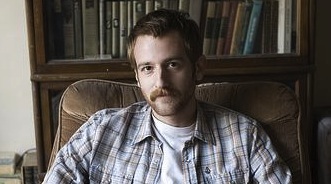Sad Brad Smith Cheers Up, Talks New Album
By Jon Graef in Arts & Entertainment on Dec 3, 2010 5:00PM

Photo by Andrew Nawrocki
Chicagoist: Your record is called Love Is Not What You Need. Is that meant to be as direct a challenge to The Beatles?
Sad Brad Smith: No, but it’s definitely a reference to them. I grew up a huge Beatles fan, and I sort of feel like they ruined my life. (laughs)
Chicagoist: How so?
SBS: Well, the idealism about love that’s expressed in their songs doesn’t paint an accurate picture. Much like Charles Manson, I think I read into them a little too deeply, maybe? (Laughs). The lyric on the record is “someday, someone will reveal/that love is not what you need/it’s how you feel.” In the context of the song, it takes on a different, a more hopeful meaning than when you pull it out of context. And I sort of like using it to mean both of those things.
Chicagoist: Can you expand more on the hopeful meaning?
SBS: Well, that hopefully the idea is that when love is there, when it’s real, it won’t be something external that you need. It’s something that you can let exist, if you allow it.
Chicagoist: There are a lot of lines on this record that are really funny. Are people missing a humorous element amidst all the melancholy?
SBS: It’s hard to say. I don’t really see a difference between presenting something humorously and presenting it seriously. They’re both different avenues to present the same topic. In life, with my personality, I often feel sad and I’m often joking about it. So I don’t separate them in the songs.
Chicagoist: A lot of people listen to sad music as a means of catharsis. Is that you’ve gotten out of music, and what you hope people get out of your music?
SBS: Absolutely. A lot of the time, the audience I picture in my head is a younger version of me struggling and looking for something to relate to … there is a sense of comfort in that.
Chicagoist: What about other mediums?
SBS: I feel like anything I really value has an equal share of comedy and pathos. I don’t want [my music] to be a strictly one thing, because life is not like that ... I read a lot of older literature, pre-1950. I tend to be reading heavy stuff, but I feel invigorated by trying to feed my brain with the wisdom that came before on how to get through [life]. (laughs)
Chicagoist: When you said mixing comedy and pathos, I thought of Kurt Vonnegut, even though he’s after 1950.
SBS: Oh, sure...And what’s great about him is that a lot of people think he’s cynical or pessimistic. Which I suppose he is. But it’s coming from a great disappointment, because he would like things to be so much better.
Chicagoist: There’s a saying that if you scratch a cynic hard enough, you’ll find a disappointed idealist underneath. Is that the kind of vibe you want to give with your music?
SBS: (Brief pause). I think so. I try not to intellectualize it too much. I just take it one song at a time... The songs are just really a reflection of my personality. I generally consider myself to be pretty melancholy, and most people who know me would say that that’s not true. Because I don’t deal with it in a self-serious way.
Chicagoist: Were you experiencing that when Up In The Air hit?
SBS: I was, actually. It seemed scary to me, because it was like, “OK, well, let’s take the best case scenario and all my dreams come true and I’m wildly successful.” And then I still don’t feel good. Then what? So there was a little bit of trepidation. But at the same time, it did get my music into a lot of people’s hands. Obviously, that’s very rewarding…it gave me the courage to take it a little bit more seriously and to put myself out there more. But I don’t think ["Help Yourself"] fully expresses what I would like to be doing. I think that it will probably take several albums and adventures before a full picture starts to become apparent.
Chicagoist: Do you feel that this album is a step in the right direction?
SBS: Well, this album is a re-release of my first album, which I put out digitally about a year ago. It never had a physical release, so now it’s coming out on vinyl with a digital download included. I am working on a new album now. It will be fairly different. Love Is Not What You Need is more of a personal account of a break-up. The newer stuff is a little broader in scope—less about me personally and more about the general state of life on earth.
Chicagoist: Do you have a title? Are there any songs you can tell me about?
SBS: I don’t have a title for the album yet. But there’s definitely some thematic connective tissue holding the songs together. Most of the songs mention dreams—not so much sleepy dreams, but dreams or hopes and the idea of magic. The hope that there’s belief in some supernatural power versus what you discover as you get older—or could discover—that there’s a harsher reality. It’s not a very uplifting album. (Laughs).
Chicagoist: Do you have happy music that you listen to?
SBS: I’m a big fan of Hawaiian music. I have a lot of Hawaiian instrumental records or vocal groups that are all pretty cheery. You can’t really get the ukulele to sound very morose. And oddly, I find that Hawaiian music goes well with the Chicago winter. The ukuleles and the harmonies with the snowfall—it actually pairs together pretty well.
Sad Brad Smith and David Singer & The Sweet Science play Saturday, December 4 at The Hideout, 1354 W Wabansia, 9 p.m., $8, 21+.